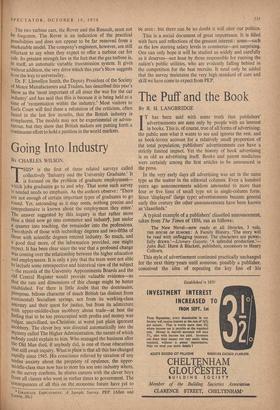Going Into Industry
13v CHARLES WILSON.
T, HIS* is the first of three related surveys called collectively 'Industry and the University Graduate.' It is focused on the problem of graduate employment— which jobs graduates go to and why. That some such survey is needed needs no emphasis. As the authors observe: 'There are not enough of certain important types of graduates to go round. Yet; astounding as it may seem, nothing precise. and Comprehensive is known about the employment they enter.' The answer suggested by this inquiry is that rather more than a third now go into commerce and industry, just under a quarter into teaching, the remainder into the professions. Two-thirds of those with technology degrees and two-fifths of those with scientific degrees entered industry. So much, and a good deal more, of the information provided, one might expect. It has been clear since the war that a profound change was coming over the relationship between the higher education and employments. It is only a pity that the team were not able to Include some retrospective and historical view of the subject --the records of the University Appointments Boards and the old Central Register would provide valuable evidence—so that the rate and dimensions of this change might be better established. For there is little doubt that the doctrinaire, Pompous, bilious character of much British (as distinct from continental) Socialism springs, not from its working-class ancestry and their quest for justice, but from its admixture with upper-middle-class snobbery about trade—at best the feeling that to be too preoccupied with profits and money was vulgar, uncivilised, un-Christian; at worst just plain ignorant snobbery. The clever boy was directed automatically into the mystery called The Higher Administration, the nature of which nobody could explain to him. Who managed the business after the Old Man died, if anybody did, is one of those obscurities that still await inquiry. What is plain is that all this has changed rapidly since 1945. His conscience relieved by taxation of any undue anxiety about the propriety of opulence, the upper- Middle-class man now has to steer his son into industry where, as the survey confirms. he shares careers with the clever boys from all classes who went in earlier times to government. The consequences of all this on the economic future have yet to GRADUATE. EMPLOYMENT. A Sample Survey. PEP. (Allen and Unwin, 30s.) be seen : but there can be no doubt it will alter our politics, This is a social document of great importance. It is filled with facts and reflections of the greatest interest : some—such as the low starting salary levels in commerce—are surprising. One can only hope it will be studied as widely and carefully as it deserves—not least by those responsible for running the nation's public utilities, who are evidently falling behind in the competition for the best recruits. It need only be added that the survey maintains the very high standard of care and skill we have come to expect from PEP.


































 Previous page
Previous page